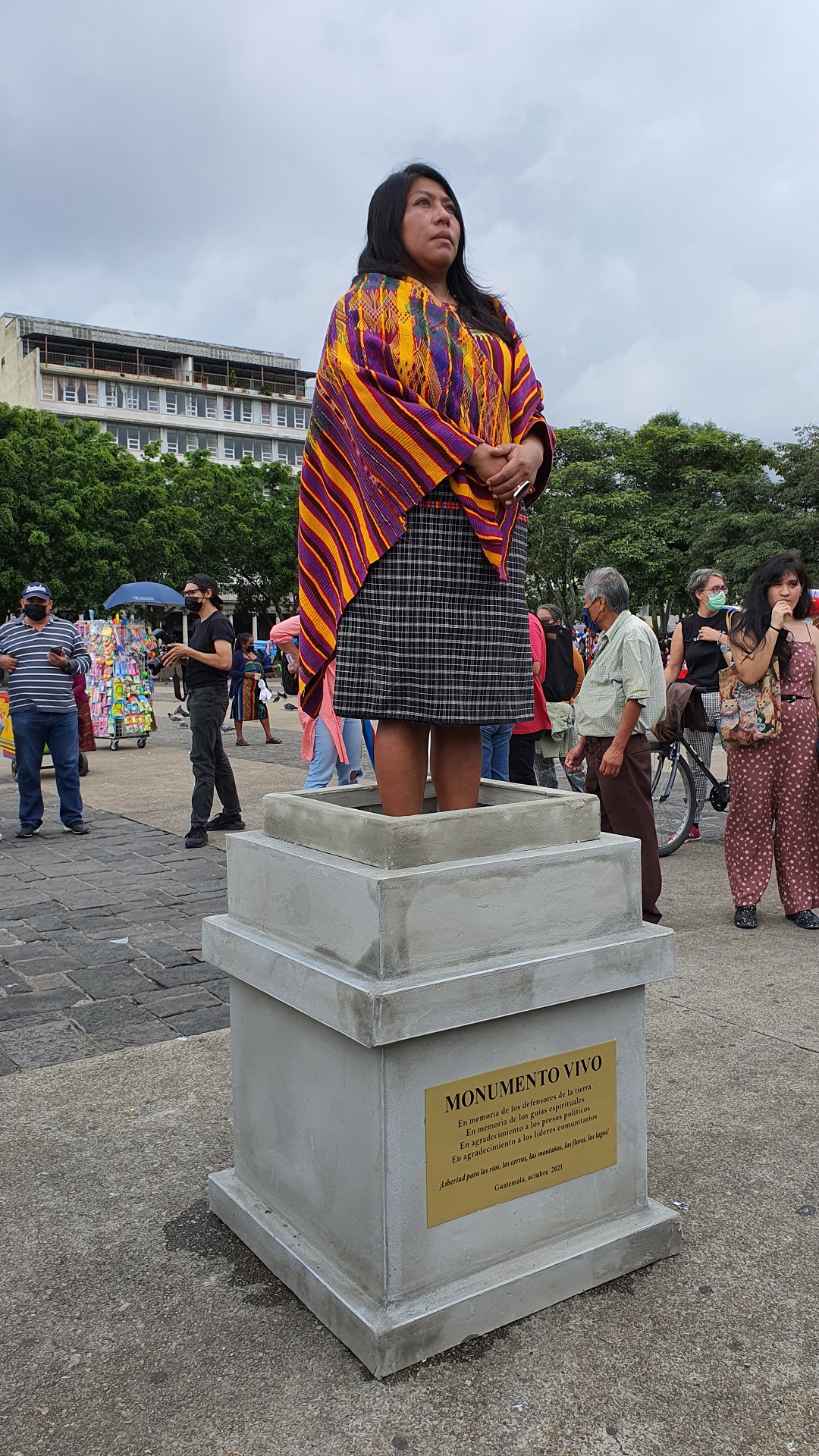05/01/2024
A new publication on artistic research and learning
LA ESCUELA___ JOURNAL
N° 1: Hydrocommons Cultures: Art, Pedagogy and Care Practices across the Americas
In May, LA ESCUELA___ is launching a new format: LA ESCUELA___ JOURNAL. The curated journal will be published once a year and will explore current ecological, social and cultural issues in Latin America at the intersection of art and education. The first volume, edited by Lisa Blackmore and Alejandro Ponce de León, brings together 19 original contributions on the hydrological challenges faced by the waters across the Americas.

Action with participation of the Oporapa community during the Geochoreographies process with Carolina Caycedo in 2014. Courtesy: Jaguos por el Territorio.
The conversations and essays by more than twenty authors are proposals for an ecocritical thinking based on artistic practices, theoretical reflections, and community responses to today's water stresses. They share a “concern for producing other ways of making, being, and relating to water, which break away from the paradigms that suffocate common waters," according to the editors.
The first issue of LA ESCUELA___ JOURNAL also includes a Hydrocommons Map, developed in collaboration with the entre-ríos project. The map locates various platforms and projects that are actively involved in the care of waters across Latin America. It also shows the hydrological connections that overflow the political and administrative borders of the nation-states.

LA ESCUELA___ JOURNAL N° 1

Hydrocommons Map.

Hydrocommons Map.
The publication aims to promote translocal dialogue and collaboration around significant challenges at the hemispheric level, and to provide valuable resources for shared learning. Like all LA ESCUELA___ texts, educational and research contributions, this journal is free of charge and can be read online and downloaded from LA ESCUELA___'s Library as of May 1st, 2024. Access to this new section is password-protected, granted automatically by subscribing to the newsletter.
Contents
In its first issue, the publication LA ESCUELA___ JOURNAL deals with the topic of hydrocommons cultures from various artistic research perspectives:
"We understand the hydrocommons as the emerging field of theories, practices, and actions that recognize water as the basic substrate of life and, in this capacity, it is a fundamental condition for more-than-human well-being"
Although it comes from the academic field, its relevance has led to fruitful connections and collaborations with art, pedagogy, and activism on a global scale. "Aesthetics is fundamental to the transition toward other water cultures, since it is a broad field for fermenting speculative sensibilities that invite us and urge us to rethink and reconnect with water."

Elina Rodríguez: “Territorio Mutado” in Prácticas de Periferia, Centro Rural de Arte (2019). Salado River, Argentina. Courtesy: Centro Rural de Arte.

María José Trucco: Soil removal. Visit to the Salado River middle basin dredge, Centro Rural de Arte (2021). Courtesy: Centro Rural de Arte.

Carolina Caycedo: Aguas Para A Vida (2016). Geochoreography. Public performance at the São Paulo Biennale 2016. Courtesy: Carolina Caycedo.

Nadia Huggins: No. 4. Circa No Future. Courtesy: Nadia Huggins.
In this sense, the volume presents a variety of voices and text forms: From essays and poetry, including non-linear texts and autoethnographies, to artistic strategies stemming from fieldwork and scientific research.
The fact that the articles span different latitudes, from southern Chile to Canada, is an editorial gesture to emphasize the complexities, specificities, and diversity of the various hydrocommons cultures across the Americas.

Marilyn Boror: Monumento vivo. Performance en la Bienal en Resistencia, Guatemala, 2021. Cortesía: Jimena Pons Gandinni.

Documentation of the program organized by Cocina CoLaboratorio for Visualizing Foodways Field School in Xochimilco, Mexico (2023). Courtesy: Katie Lawson.
Contributions
LA ESCUELA___ JOURNAL N° 1: Hydrocommons Cultures: Art, Pedagogy and Care Practices across the Americas is divided into four sections that invite reflection on the ways and means by which Hydrocommons Cultures are energized in the region.
Liquid Pedagogies addresses the question of what and how we learn from water and how learning can enable changes that translate into actions. Artistic Practices for Living Waters brings together works involving movement, these “expanded practices” range from, performance, pedagogical strategies, and curatorial work that demonstrate how art transcends conventional methods and spaces. Ecocritical Panoramas in Amphibious Worlds explores the aesthetic mediation of rivers, oceans, and (human) bodies of and in water through contemporary artistic practices. Actions towards Hydrocommons Ecologies and Economies visualizes forms of water management and ecological restoration that produce and enhance life in specific communities. The volume closes with a Hydrocommons Map that features a selection of initiatives, collectives and communities working to care for different types of bodies of water across Latin America.
The publication contains contributions by: Astrida Neimanis, Cecilia Vicuña, Carolina Caycedo, Camila Marambio with Carla Macchiavello, Tatiana Flores, Elisa Silva with the collaboration of Ellie Bailey, Elizabeth Gallón Droste with Daniela Medina Poch, Alejandra Ortiz de Zevallos, Lior Zisman Zalis with Guilherme Queiroz, Elina Rodríguez with María José Trucco, Marina Guzzo with Kidauane Regina Alves, Luisa Giraldo Murillo, María Paz Amaro Cavada, Katie Lawson, Camila Stipo, Diego Ventura Puac-Coyoy, Diana Barquero and Mauricio Patrón Rivera with Ana Emilia Felker Centeno.

A portrait of the jungle and its people. Topopte de Acahual educational program in the Los Tuxtlas Biosphere Reserve, Veracruz, Mexico. Photo: Dan Sánchez D. Vil. Courtesy: Vivero de Tebanca.

Community members of Agua del Espino coming together to participate in a reforestation activity as part of their tequio (voluntary work) tradition. July 2021. Photo: Elisa Silva.
LA ESCUELA_ is a growing art platform that creates and strengthens translocal connections through collective learning experiences at the intersection of art and education. LA ESCUELA_ was founded by artist Miguel Braceli together with the international foundation Siemens Stiftung, approaching art as education and education as collective learning in public space. Its aim is to address the social, political and ecological challenges of specific places through artistic practices on site.
We invite you to read and download LA ESCUELA___ JOURNAL N° 1 and become part of our community to receive the password and PDF edition, as well as to stay informed about upcoming calls, programs, and publications of LA ESCUELA___.